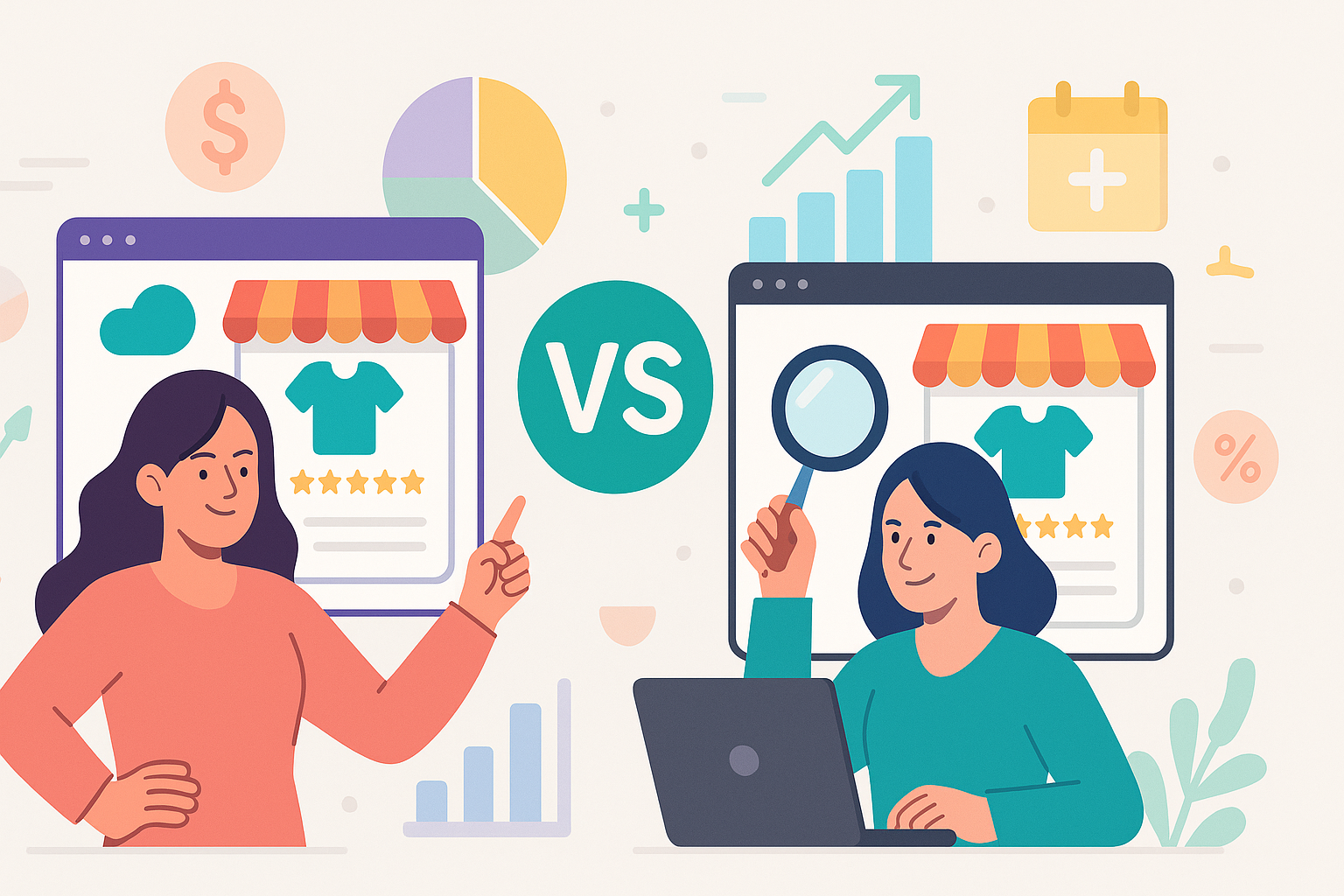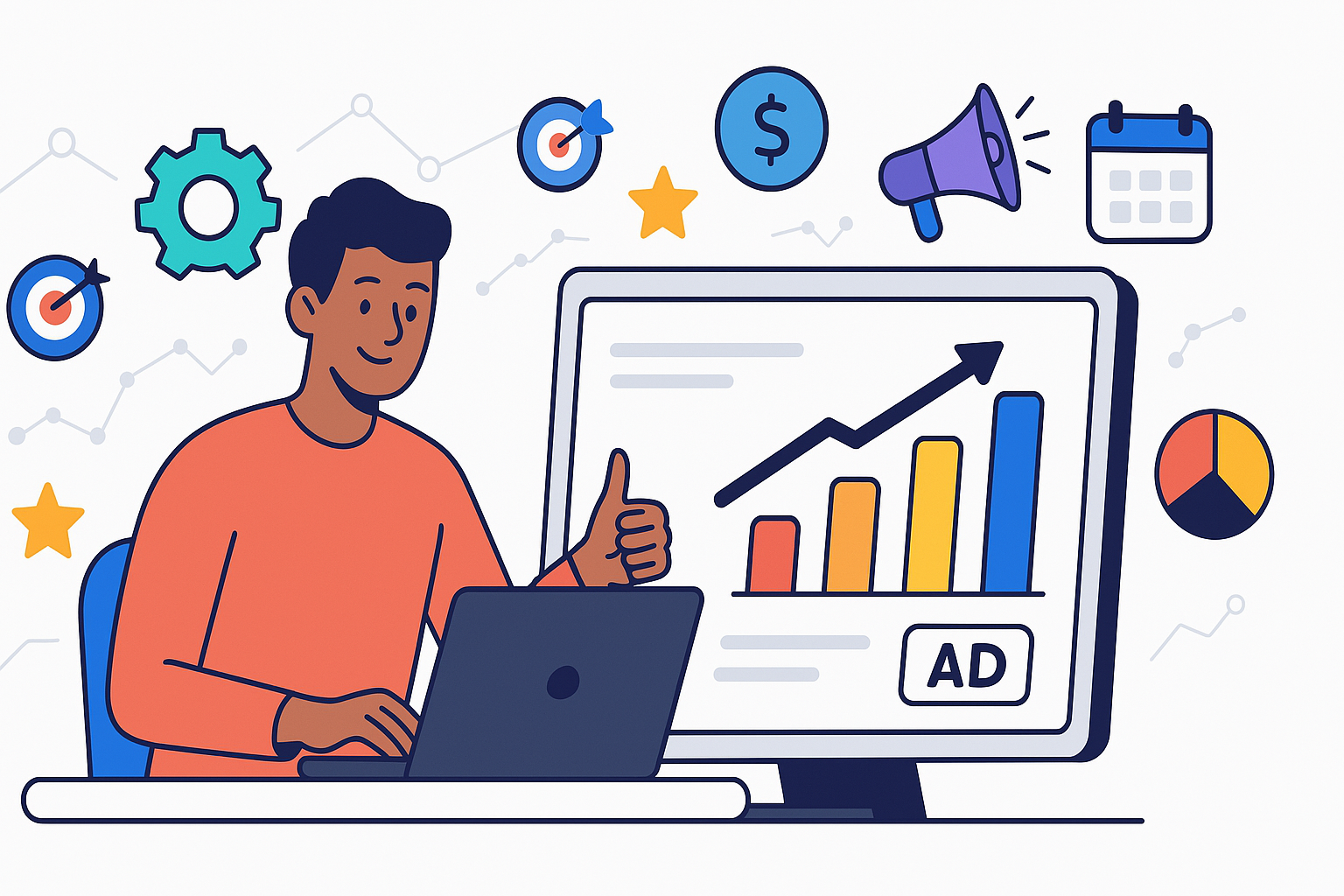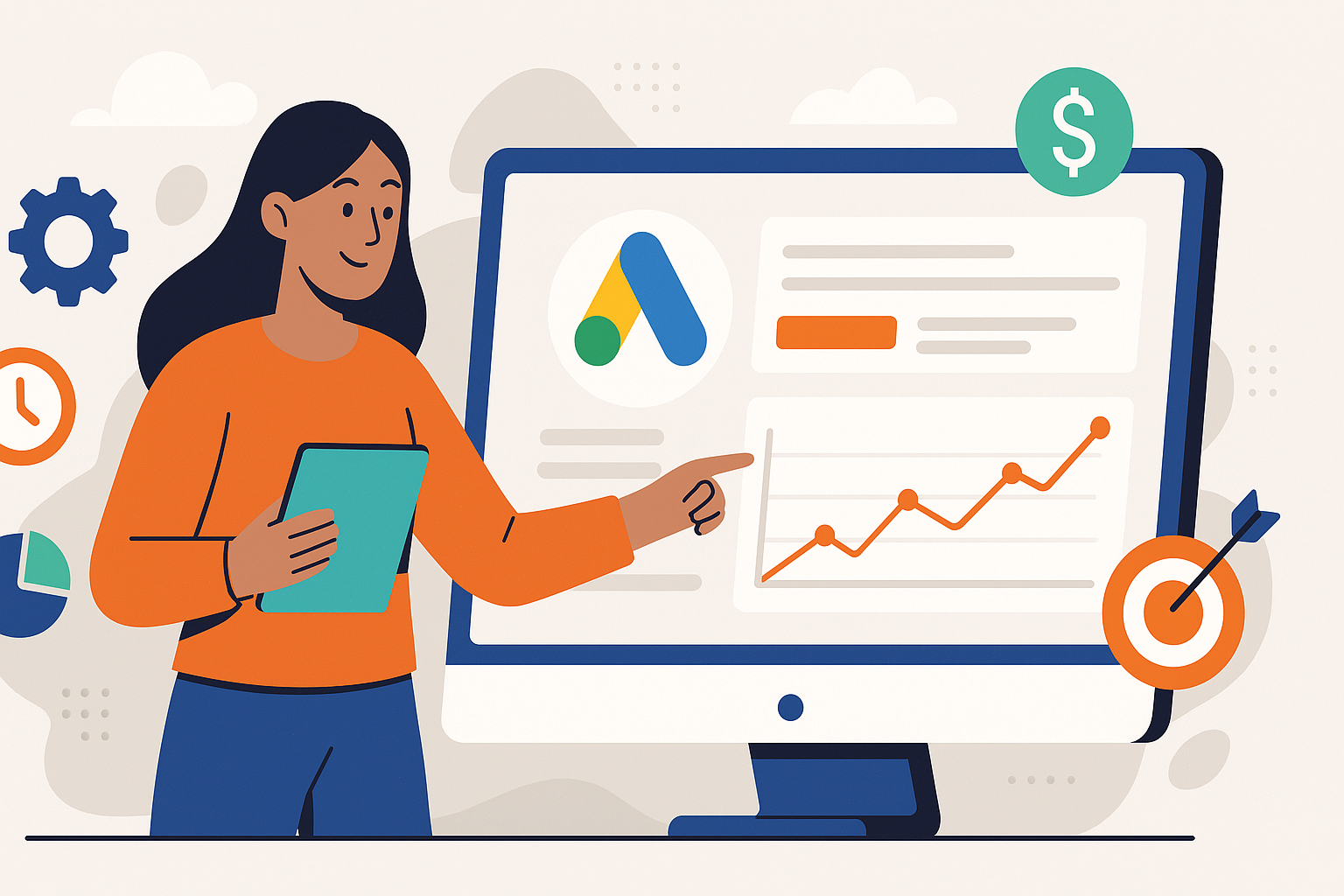In-House vs Outsourced PPC: The Definitive Guide for Optimal ROI
by Francisco Kraefft on 20 Nov, 2024
Choosing the right operating model for your Pay-Per-Click (PPC) advertising is a critical decision with significant implications for your budget, performance, and overall growth trajectory. You're likely weighing the benefits of maintaining direct control with an internal team against leveraging the specialized knowledge of an external agency. This isn't just an operational choice; it's a strategic one that impacts how effectively you capture market share and achieve your business objectives through paid search and social channels. Understanding the nuanced differences, potential costs, and performance expectations associated with both in-house vs outsourced PPC management is paramount. Let's explore the key factors you need to consider to determine which path aligns best with your company's resources, goals, and ambition for scalable success.
Defining the Core Choice: In-House vs. Outsourced PPC Operations
At its heart, the in-house vs outsourced PPC debate centers on who manages your paid advertising campaigns. While you're familiar with the basics, let's crystallize the operational distinctions to set the stage for a deeper analysis.
In-House PPC Management: This model involves building and maintaining your own team dedicated to planning, executing, managing, and optimizing your PPC campaigns.
- Structure: Typically involves hiring one or more PPC specialists, managers, or analysts who become full-time employees of your company.
- Integration: This team operates within your existing organizational structure, ideally collaborating closely with other marketing functions (SEO, content, social), sales, and product development.
- Resources: Requires investment not just in salaries and benefits, but also in necessary software subscriptions (keyword research tools, bid management platforms, analytics suites), training, and potentially dedicated office space.
- Control: Offers maximum direct control over strategy, execution, brand messaging, and budget allocation on a day-to-day basis.
Outsourced PPC Management: This model involves partnering with an external digital marketing agency or specialized PPC consultants who manage your campaigns on your behalf.
- Structure: You engage a third-party provider through a contractual agreement, typically involving retainers, percentage-of-spend fees, or performance-based compensation.
- Integration: Requires establishing clear communication channels, reporting structures, and alignment meetings between your internal point-of-contact (often a marketing manager) and the agency team.
- Resources: Primarily involves the agency fee. The agency typically utilizes its own suite of advanced tools and technologies across its client portfolio, often providing access to platforms you might not invest in independently.
- Control: Involves entrusting strategic and tactical execution to the agency, guided by agreed-upon goals and KPIs. Control is exercised through regular reporting, performance reviews, and strategic direction setting.
Understanding these fundamental operational differences is the first step. The best choice isn't universal; it hinges on a complex interplay of factors we will explore, including cost, expertise, scalability, control, and ultimately, performance.
The Case for In-House PPC: Control, Culture, and Deep Integration
Keeping your PPC management under your own roof offers compelling advantages, particularly concerning control and alignment with your unique business context.
Unparalleled Brand & Product Immersion: Your internal team lives and breathes your brand, culture, and products daily.
- Deep Understanding: They possess an intrinsic understanding of your target audience nuances, unique selling propositions (USPs), and the competitive landscape that's hard for an external partner to replicate quickly.
- Brand Voice Consistency: Ensuring ad copy, landing page messaging, and overall campaign tone perfectly align with your brand identity is more straightforward.
Direct Control & Agility: Having the team down the hall (or a Slack message away) facilitates rapid adjustments.
- Real-time Optimization: Reacting instantly to market shifts, competitor actions, or internal promotions becomes easier.
- Strategic Alignment: Direct oversight ensures PPC strategies are always perfectly synchronized with broader marketing campaigns and business objectives.
- Data Ownership: All campaign data, learnings, and historical performance metrics remain entirely within your company's possession.
Seamless Internal Collaboration: An in-house team can integrate more fluidly with other departments.
- Marketing Synergy: Collaboration with SEO, content marketing, email marketing, and social media teams can lead to more holistic digital strategies. Insights from PPC (like high-performing keywords) can inform SEO and content efforts, and vice-versa.
- Sales Feedback Loop: Direct communication with the sales team provides immediate feedback on lead quality generated from PPC efforts, allowing for faster campaign refinement.
- Product Insights: PPC campaign data can offer valuable insights into customer search behavior and preferences, informing product development decisions.
Cultural Fit & Long-Term Investment: Building an in-house team means cultivating talent that embodies your company values.
- Team Development: You invest in the growth and expertise of your employees, fostering loyalty and long-term strategic assets.
- Dedicated Focus: Your internal team is 100% dedicated to your business, unlike an agency juggling multiple clients.
However, Building In-House Isn't Without Hurdles:
- Talent Acquisition & Retention: Finding, hiring, and retaining skilled PPC professionals is highly competitive and can be costly and time-consuming. Consider the questions to ask a Google Ads expert even when hiring internally.
- Keeping Abreast of Change: The PPC landscape evolves rapidly. Ensuring your team stays updated on the latest platform changes, strategies, and technologies requires ongoing investment in training and development.
- Resource Intensity: Beyond salaries, the costs of tools, training, and management overhead can be substantial.
Opting for an in-house team makes sense if you prioritize deep brand integration, require maximum control and agility, and have the resources and commitment to build and nurture specialized internal talent.
The Power of Outsourcing PPC: Specialized Expertise, Scalability & Advanced Tech
Partnering with a specialized PPC agency, like iVirtual, brings a distinct set of advantages often centered around expertise, efficiency, and access to resources that are difficult to replicate internally.
Access to Specialized Expertise & Diverse Skill Sets: Agencies live and breathe PPC. This is their core competency.
- Deep Platform Knowledge: Agency professionals often have advanced certifications and hands-on experience across multiple platforms (Google Ads, Microsoft Ads, Meta, LinkedIn, etc.) and ad formats.
- Cross-Industry Insights: Working with clients in various sectors gives agencies a broad perspective on what strategies work, enabling cross-pollination of successful tactics.
- Team Depth: You gain access to a team of specialists – strategists, analysts, copywriters, landing page optimizers – whose combined expertise often surpasses what a small internal team can offer.
Scalability and Flexibility: Agencies are built to adapt to changing needs.
- Effortless Scaling: Need to ramp up spend for a seasonal promotion or scale back during slower periods? Agencies can typically adjust resources and campaign intensity more fluidly than hiring or reducing internal staff.
- Market Expansion: Entering new markets or launching new product lines? An experienced agency can leverage its knowledge to accelerate your entry and optimize campaigns for different geographies or audiences.
Leveraging Advanced Technology & Tools: Top agencies invest heavily in the best MarTech stack.
- Premium Software Access: Agencies often subscribe to enterprise-level bid management platforms, competitive intelligence tools, advanced analytics suites, and call tracking software. The cost of these tools is spread across their client base, making them more accessible than individual subscriptions.
- Early Beta Access: Agencies frequently get early access to new platform features and beta programs from Google, Meta, etc., allowing you to benefit from cutting-edge opportunities sooner.
Cost-Effectiveness (Often Surprising): While agency fees are a direct cost, outsourcing can be more economical when considering the total cost of an equivalent in-house team.
- Reduced Overhead: Avoids expenses related to salaries, benefits, recruitment, training, office space, and internal management time dedicated to the PPC function.
- Efficiency Gains: Experienced agency teams often work more efficiently, leveraging established processes and tools to achieve results faster.
Objectivity and Performance Focus: An external partner brings a fresh, objective perspective.
- Data-Driven Decisions: Reputable agencies (especially performance marketing focused ones like us) are inherently data-driven, focusing squarely on delivering measurable results (ROI, CPA, ROAS) aligned with your business goals.
- Challenging Assumptions: An external viewpoint can help challenge internal biases and identify new opportunities or areas for improvement that might be overlooked internally.
Choosing to outsource your PPC management is often ideal if you seek deep, specialized expertise, require flexibility and scalability, want access to cutting-edge technology without the direct investment, and prioritize a relentless focus on measurable performance.
Cost Analysis Deep Dive: Uncovering the True Expenses of In-House vs. Outsourced PPC
A common misconception is that in-house PPC is always cheaper because you avoid agency fees. However, a thorough cost analysis reveals a more complex picture. Calculating the Total Cost of Ownership (TCO) for each model is crucial for an informed in-house vs outsourced PPC decision.
Calculating In-House PPC Costs: Go beyond just the base salary. Consider these factors:
- Salaries & Benefits: Include base salary, bonuses, payroll taxes, health insurance, retirement contributions, paid time off, etc. Remember, experienced PPC managers command competitive salaries.
- Recruitment & Onboarding: Factor in the costs associated with job postings, recruiter fees (if used), interview time (for multiple internal stakeholders), background checks, and the time/resources needed to onboard the new hire.
- Training & Development: Budget for ongoing training, certifications (Google Ads, Microsoft Ads, etc.), industry conferences, and subscriptions to learning resources to keep skills sharp.
- Software & Tools: Account for monthly or annual subscriptions for essential PPC tools:
- Keyword Research (e.g., Semrush, Ahrefs)
- Bid Management Platforms (e.g., Optmyzr, Skai)
- Competitive Intelligence (e.g., SpyFu)
- Landing Page Builders/Optimizers (e.g., Unbounce, Instapage)
- Call Tracking (e.g., CallRail, Invoca)
- Advanced Analytics/Reporting Tools
- Management Overhead: Include the time your marketing director or other managers spend overseeing the PPC specialist(s), attending meetings, reviewing reports, and managing their performance.
- Infrastructure: While often minimal, consider costs like additional office space, computer hardware, etc., if applicable.
Calculating Outsourced PPC Costs: This seems simpler, but nuances exist:
- Agency Fees: This is the primary cost, structured typically as:
- Monthly Retainer: A fixed fee, common for ongoing management.
- Percentage of Ad Spend: A common model, often tiered (e.g., 10-15% of spend). Learn more about PPC costs.
- Performance-Based: Fees tied directly to hitting specific KPIs (e.g., cost per lead, ROAS targets). Requires careful goal alignment.
- Hybrid Models: Combinations of the above.
- Onboarding/Setup Fees: Some agencies charge an initial fee for account audits, strategy development, and campaign setup.
- Minimum Ad Spend Requirements: Some agencies require a minimum monthly ad spend level to engage their services.
- Contract Length & Termination Clauses: Understand the commitment duration and any penalties for early termination.
- Internal Liaison Time: Factor in the time your internal point-person spends communicating with the agency, reviewing reports, and providing necessary information/approvals.
Making the Comparison:
- Quantify Everything: Assign realistic dollar values to all components listed above for both scenarios.
- Consider Scale: How do costs change if you need to significantly increase your ad spend or campaign complexity? Outsourcing often scales more predictably.
- Factor in Opportunity Cost: What is the cost of not having top-tier expertise managing your campaigns from day one if you opt to build internally? Conversely, what's the potential cost of agency ramp-up time?
A detailed TCO analysis often reveals that outsourcing PPC to a specialized agency can be surprisingly cost-competitive, especially when factoring in the full burden of building and maintaining a high-performing internal team and the associated technology stack.
Performance & ROI: Which Model Drives Superior PPC Results?
Ultimately, the decision between in-house vs outsourced PPC often comes down to which model delivers better performance and a stronger Return on Investment (ROI) or Return on Ad Spend (ROAS). While control (in-house) and specialized knowledge (outsourced) are key considerations, results are the ultimate benchmark. See our guide on essential PPC KPIs.
Factors Influencing In-House Performance:
- Depth of Business Understanding: As discussed, an internal team's intimate knowledge can lead to highly relevant ad copy and targeting. However, this can sometimes lead to tunnel vision or resistance to testing radically different approaches.
- Team Skill & Experience: Performance is directly tied to the expertise level of your hired specialist(s). A junior manager may struggle with complex account structures or advanced optimization techniques compared to a seasoned veteran.
- Bandwidth & Focus: Internal marketers often wear multiple hats. If your PPC specialist is also managing email marketing or social media, their focus on PPC optimization might be diluted, impacting results.
- Access to Tools & Data: Performance can be hampered if the internal team lacks access to the best optimization tools or struggles to integrate data from various sources for holistic analysis.
Factors Influencing Outsourced Performance:
- Specialized Expertise & Best Practices: Agencies leverage collective knowledge and standardized best practices honed across numerous accounts. They are often quicker to adopt new platform features and optimization methodologies.
- Data Analysis & Technology: Performance-focused agencies, like iVirtual, excel at data analysis, utilizing sophisticated tools for attribution modeling, audience segmentation, and predictive analytics to maximize ROI.
- Rigorous Testing Culture: Agencies typically have robust processes for A/B testing ad copy, landing pages, bidding strategies, and targeting options, constantly seeking incremental performance gains.
- Objectivity & Accountability: Agencies are accountable for delivering results based on agreed-upon KPIs. This external pressure often drives a relentless focus on performance optimization. However, success depends heavily on clear communication and goal alignment between you and the agency.
Measuring Success: Beyond Clicks and Impressions: Regardless of the model, focus on metrics that matter to your bottom line:
- Conversion Rate: Percentage of clicks that result in desired actions (leads, sales, sign-ups).
- Cost Per Acquisition (CPA) / Cost Per Lead (CPL): How much you spend to acquire one customer or lead.
- Return on Ad Spend (ROAS): Revenue generated for every dollar spent on advertising.
- Customer Lifetime Value (CLTV) from PPC: Understanding the long-term value of customers acquired through paid channels.
Which Model Wins on Performance? While a highly skilled, well-resourced in-house team can achieve excellent results, specialized agencies often have an edge in driving consistent, scalable performance, particularly for complex accounts or businesses focused on aggressive growth. This stems from their concentrated expertise, access to technology, diverse experience, and dedicated focus solely on maximizing PPC outcomes. Agencies are built around processes designed to test, learn, and optimize relentlessly—core tenets of successful performance marketing. The key is choosing the right agency partner whose approach aligns with your data-driven goals.
Making the Right Choice: Tailoring Your PPC Strategy to Your Business Needs
The optimal choice between in-house vs outsourced PPC isn't black and white; it's highly dependent on your specific business context, resources, and strategic priorities. Let's synthesize the key factors to guide your decision-making process.
Consider Your Business Size and Stage:
- Startups & Small Businesses: Often benefit from outsourcing. Accessing expert-level management without the high overhead of full-time hires is usually more feasible. Agencies provide immediate expertise and established processes. Check our guide on PPC budgets for small businesses.
- Mid-Sized Businesses: This is often where the decision is most nuanced. Factors like budget, internal marketing capabilities, and growth ambitions weigh heavily. A detailed cost-benefit analysis (as discussed in Section 4) is crucial. Hybrid models can also be effective here.
- Large Enterprises: May have the resources to build substantial in-house teams. However, even large companies often outsource specialized areas of PPC (e.g., international campaigns, programmatic display) or use agencies for strategic oversight, audits, or to supplement internal capabilities.
Evaluate Your Budget & Resources:
- Limited Budget: Outsourcing can provide access to expertise that's unaffordable via full-time hires. Agency fees might be more manageable than the total cost of an internal team.
- Significant Budget: If you have substantial resources, building an in-house team becomes more viable, but compare this TCO rigorously against the potential ROI uplift from a top-tier agency's expertise and technology.
Assess Your Need for Control vs. Specialized Expertise:
- High Need for Control/Integration: If daily, granular control and deep integration with highly sensitive internal processes are paramount, an in-house team might be preferred.
- Prioritizing Cutting-Edge Strategy & Performance: If accessing the latest strategies, advanced technology, and a relentless focus on measurable ROI is the top priority, outsourcing to a specialist agency often yields better results.
Analyze Your Industry Complexity & Campaign Scale:
- Highly Competitive/Complex Niches: Industries with sophisticated competitors or complex conversion funnels often benefit from agency experience navigating similar challenges.
- Large Scale/Multi-Channel Campaigns: Managing significant budgets across multiple platforms (Google, Meta, LinkedIn, Amazon Ads, etc.) requires robust systems and expertise that agencies are structured to handle efficiently.
Exploring Hybrid Models: A compromise can sometimes offer the best of both worlds:
- In-House Strategy, Outsourced Execution: An internal marketing manager sets the overall strategy and KPIs, while an agency handles the day-to-day campaign management and optimization.
- Project-Based Outsourcing: Using an agency for specific tasks like initial campaign setup, account audits, or launching in new markets, while handling ongoing management internally.
- Agency as Consultant: Engaging an agency periodically for strategic reviews, training internal staff, or troubleshooting performance issues.
The Bottom Line: Carefully weigh these factors against your unique circumstances. Be honest about your internal capabilities, long-term goals, and tolerance for managing either an internal team or an agency relationship. There's no single right answer, but a well-considered decision based on these criteria will set your PPC efforts up for greater success.
Conclusion
Choosing between in-house and outsourced PPC management requires careful consideration of your specific needs, resources, and performance goals. In-house offers deep integration and control, demanding significant investment in talent and tools. Outsourcing provides access to specialized expertise, scalability, and advanced technology, often proving more cost-effective and driving superior ROI, especially for businesses prioritizing growth and data-driven results. Analyze the true costs, evaluate your internal capabilities versus agency strengths, and align your choice with your strategic objectives. Making an informed decision is the first step towards maximizing your return from paid advertising.
Ready to unlock the full potential of your PPC campaigns with data-driven strategies and measurable results? Let iVirtual's team of performance marketing experts take the guesswork out of growth. Contact us today for a consultation and discover how our tailored approach can scale your business.


